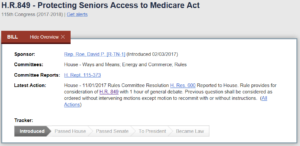Rep. Gabbard Votes to Protect Healthcare for Kūpuna, Increase Medicare Transparency
Congresswoman Tulsi Gabbard voted to pass HR 849, “Protecting Seniors’ Access to Medicare” Act of 2017. This bipartisan legislation would take Medicare authority away from the Independent Payment Advisory Board (IPAB), an independent board of 15 unelected, unaccountable members given largely unchecked authority to make sweeping cuts to Medicare spending. With no nominees presently on the board, current law could give the Secretary of Health and Human Services unilateral power to make changes to Medicare, bypassing congressional legislative authority. The bill passed the House by a vote of 307 to 111.
Ending the IPAB is supported by a coalition of medical organizations representing 450,000 physicians and the patients they serve, including the American Hospital Association and the American Medical Association, along with the Hawaiʻi Medical Association, Epilepsy Foundation of Hawaiʻi, National Kidney Foundation Hawaiʻi Chapter, among others.
“Leaders on both sides of the aisle have long agreed that the IPAB is the wrong way to address Medicare costs,” Rep. Gabbard said. “Along with placing seniors’ healthcare into the hands of unelected government bureaucrats, or even worse, a single cabinet secretary, the structure of the IPAB allows for sweeping cuts without taking into account the quality of care. Rather than finding ways to pinch pennies on the backs of our kūpuna, we need to focus on the root of the problem and enact real reforms to our broken healthcare system.”
“IPAB is a flawed policy that the Hawaiʻi Medical Association has been advocating for the repeal of since the Affordable Care Act was passed. It would put significant health care payment and policy decisions in the hands of an independent body of individuals with far too little accountability. Additionally, IPAB’s arbitrary, annual cost-cutting targets would lead to short term strategies that would threaten access to care for Medicare patients across Hawaiʻi, but would be most harmful to Hawaii’s kūpuna in the underserved areas and neighbor islands,” said Christopher D. Flanders, DO, executive director of the Hawaiʻi Medical Association.















